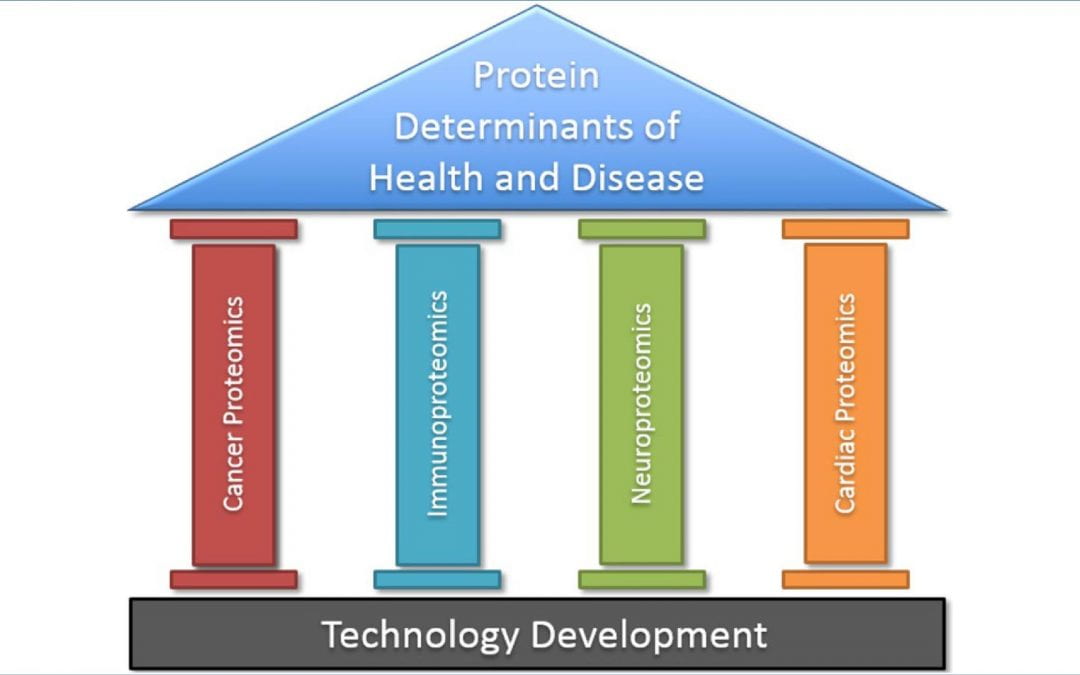Northwestern University received $7 million this year from the National Institute of General Medical Sciences to continue to push the boundaries of precision proteomics through new technologies and approaches to heart disease, cancer, neurological diseases and immuno-disorders, and to expand community engagement. The five-year grant builds upon the success of the National Resource for Translational and Developmental Proteomics (NRTDP), established in 2015 by Northwestern Proteomics, a center affiliated with Chemistry of Life Processes Institute.
“By providing far greater detail with next-generation technology, our national proteomics center is changing the fundamentals of how to read out proteins in basic and clinical research,” says Neil Kelleher, PhD, the Walter and Mary E. Glass Professor of Molecular Biosciences and Faculty Director, Northwestern Proteomics. “This is increasing the efficiency of detection and assignment of function to proteins and their myriad modifications.”
The grant will enable major upgrades in technology for cell-specific analysis of whole protein molecules — an approach known as top-down proteomics.
Advancing Biomedical Research from SARS-CoV-2 and Cancer to Alzheimer’s
“In the past five years, we’ve been on the warpath to teach people about proteoforms,” said Paul Thomas, PhD, Research Associate Professor, Molecular Biosciences and Managing Director of Northwestern Proteomics. “Proteoforms are the individual modified protein molecules that exist in a biological system that may be responsive to, or causative of, diseases.”
The Center will advance dozens of translational research programs across Northwestern and other academic institutions that will focus on four key areas of research led by Jeannie Camarillo, PhD (Cancer Proteomics), Eleonora Forte, PhD (Immunoproteomics), Steven Patrie, PhD (Neuroproteomics), and John Wilkins, MD (Cardiac Proteomics).
Project collaborators will look at the proteomics of pediatric brain tumors, liver transplant rejection, aging, heart failure, and Alzheimer’s and Parkinson’s disease, to name a few. These efforts, in turn, will drive technology development and applications for NRTDP’s new style of mass spectrometry-based proteomics.
“Despite decades of effort we have only begun to scratch the surface regarding the complex proteoform-level landscape of many disease-modifying proteins involved in neurodegenerative disorders such as Alzheimer’s disease and Parkinson’s disease.” says Patrie, Research Associate Professor of Chemistry and Director of Neuroproteomics. “With greater understanding of the composition and structure of proteins in the brain, as well as, the selectivity of diagnostics/therapeutics for families of proteoforms, the path to effective early diagnostics and disease-modifying therapeutics will undoubtedly become clearer.”
The Center is supported by “an exceptional group of research scholars” says Kelleher. In addition to Kelleher, Thomas, and the heads of the Center’s four research pillars, the leadership team includes:
- Jared Kafader, Director of Instrumentation (incoming)
- Phil Compton, Director of Instrumentation (outgoing)
- Richard LeDuc, Director of Computational Proteomics
- Robert (Vince) Gerbasi, Director of Immunoproteomics (outgoing)
- Ryan Fellers, Director of Software Engineering
- Young Ah Goo, Director of the Proteomics Core
Improved Testing for COVID-19
Proteoform-level analysis allows drug developers to find higher value biomarkers for disease, including COVID-19. Center researchers are working closely with Northwestern Feinberg School of Medicine investigators to understand how the human body generates antibodies to the SARS-CoV-2 proteins.
“We expect that our transplant patients, who all are on immunosuppression to maintain their transplanted organ, will respond differently to COVID-19,” says Feinberg investigator Daniela P Ladner, MD, MPH, Associate Professor of Surgery and Medical Social Sciences. “Our collaboration with the Proteomics Center allows us to examine the antibody repertoire of COVID-19 positive transplant recipients.”
Expanding the Field
To encourage widespread adoption of top-down proteomics, NTDP offers a robust four-day training course for users of the Center’s core facilities located in Chicago and Evanston. The Center also provides tools, materials, tutorials and exportable workflows enabling researchers among multiple disciplines and institutions to routinely access mass spectrometric measurements of their samples and proteins of interest.
“In its next five years, the Center will support over 100 laboratories at Northwestern and beyond, accelerating technology uptake via dissemination in the public and private sectors, and increasing the number of examples where proteoform-resolved biology provides clarity across a range of diseases,” says Kelleher. “We’ve also spun out a new company, Integrated Protein Technologies led by Phil Compton, that will enable the field to continue to flourish and make significant advances in human health and disease.”
Research reported in this publication was supported by the National Institute of General Medical Sciences of the National Institutes of Health under Award Number P41GM108569. The content is solely the responsibility of the authors and does not necessarily represent the official views of the National Institutes of Health.
